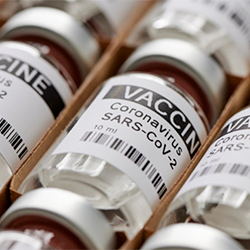By Marie Rosenthal, MS
Almost 50 more health care associations, including the ASHP, are now calling for COVID-19 vaccines to be a condition of employment for all workers in health and long-term care as cases, hospitalizations and deaths increase.

“We are very glad to sign onto the joint statement in support of COVID-19 vaccine mandates for all workers in health care and those in long-term care,” Anna Legreid Dopp, PharmD, the ASHP senior director, Clinical Guidelines and Quality Improvements.
“Vaccinating the healthcare workforce against COVID-19 is safeguard to patient and public health and critical for the resiliency of the health care system which is why we wholeheartedly signed onto the joint letter,” Dr. Legreid Dopp said.
They join the Society for Healthcare Epidemiology of America, the Infectious Diseases Society of America, the Society of Infectious Diseases Pharmacists and four other organizations in calling for the mandates (Infect Control Hosp Epidemiol 2021 Jul 13. doi:10.1017/ice.2021.322). The consensus statement recommends that COVID-19 vaccination be made a condition of employment at health care facilities across the country.
“Requiring the health care workforce to be vaccinated is an ethical, effective and life-saving approach to protect our patients,” ASHP CEO Paul W. Abramowitz, PharmD, ScD (Hon), FASHP, said in a statement, adding that “health care providers should serve as examples to everyone” by receiving the vaccine.
“We call for all health care employers to require their employees to be vaccinated against COVID-19,” he said.
As of July 22, 35% of U.S. counties are seeing high levels of community transmission of SARS-CoV-2. The seven-day average of new cases was 40,246, a 46.7% increase over the previous seven-day average of 27,443. In that time, 3,521 people were hospitalized, a 32.2% increase over the previous seven days.
Most cases are among unvaccinated people, according to the CDC. As of July 26, only 56.8% of the population had received one dose of COVID-19 vaccine and 49.1% was fully vaccinated, in CDC data.
The highly contagious Delta variant, which is now the predominant strain in the United States, and the continued refusal of many people to be vaccinated formed the rationale for the consensus statement, according to all the signatories.
The Delta variant is highly transmissible (Lancet 2021 June 14. doi: https://doi.org/10.1016/S0140-6736(21)01358-1).
“There is a higher risk of hospitalizations from this variant, and most rapid spread is occurring in those states that have the highest percentage of unvaccinated people,” said David J. Weber, MD, MPH, the lead author of the consensus statement, when it was released. “So, this is a good time to be pushing vaccination to the general public, first of all, to protect themselves from this highly transmissible, more dangerous pathogen, but also to be protecting our health care providers, because we will frequently have exposure to patients with known or suspected disease.”
Unfortunately, without mandates, health care workers are less likely to receive vaccinations, according to Erica S. Shenoy, MD, PhD, of Massachusetts General Hospital and Harvard Medical School, in Boston.
“We have very good data that without vaccine being a condition of employment, it is very difficult to achieve the high levels of vaccination that we are looking for,” said Dr. Shenoy, who pointed to the 2019-2020 influenza season, which saw health care worker uptake of 80% for the seasonal influenza vaccine. Most worked in a facility that required vaccination.
“If you break that down by health care personnel who worked for employers who require it versus those who do not, there is quite a difference,” she said. “In those who required it, it was over 94% compliance; and in those who did not, it was around 69%.”
There is a precedent for mandating vaccines among health care workers, Dr. Legreid Dopp reminded. “We’ve seen them with hepatitis B vaccines, with influenza vaccines. So, this is not out of the realm of an expectation for a health care workforce that provides services to patients.
“It’s a tool in the toolbox to try to advance patient safety.”
As an aside, Dr. Legreid Dopp, said that ASHP surveyed its membership in December, and more than 90% of pharmacists that participated in the survey said they would get the vaccine. They surveyed them again early in 2021 after the vaccine was available, and 84% had been fully vaccinated. She said that this shows that hospital and health system pharmacists understand the importance of COVID-19 vaccination.
The consensus statement outlines ways to engage stakeholders and improve vaccination rates before implementing a policy for vaccination as a condition of employment, but detailed information about mandating vaccination is emphasized that covers the safety and efficacy of current vaccines, legal considerations and the need for education. It also discusses the advantages of having a fully vaccinated workforce.
The paper also specifies the need for exemptions for workers with medical contraindications and some other circumstances in compliance with federal and state laws.
What constitutes an exemption must be clearly stated, the panel said, and there has to be a process for the employees who are seeking an exemption.
“While we recognize some health care workers cannot be compelled to be vaccinated due to medical and religious reasons and therefore may be exempted from a mandate, they constitute a small number of all workers who should be vaccinated. Employers should also consider any applicable state and local laws on a case-by-case basis,” Dr. Abramowitz said.
“The first concern of pharmacists and all pharmacy professionals is the health and well-being of our patients, particularly those who face increased risk of infection as cases of the COVID-19 Delta variant surge across the country,” Dr. Abramowitz said. “Every patient should know they are not being put at risk of infection by the professionals providing their care.”
